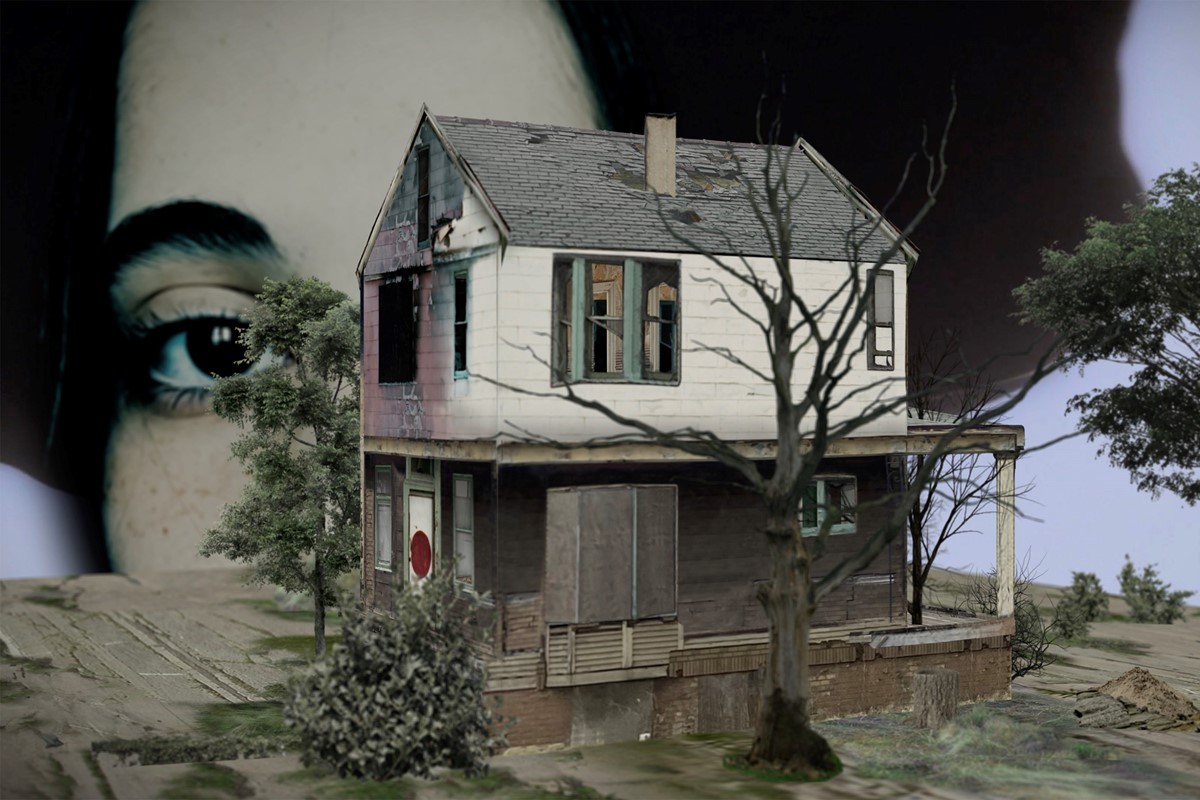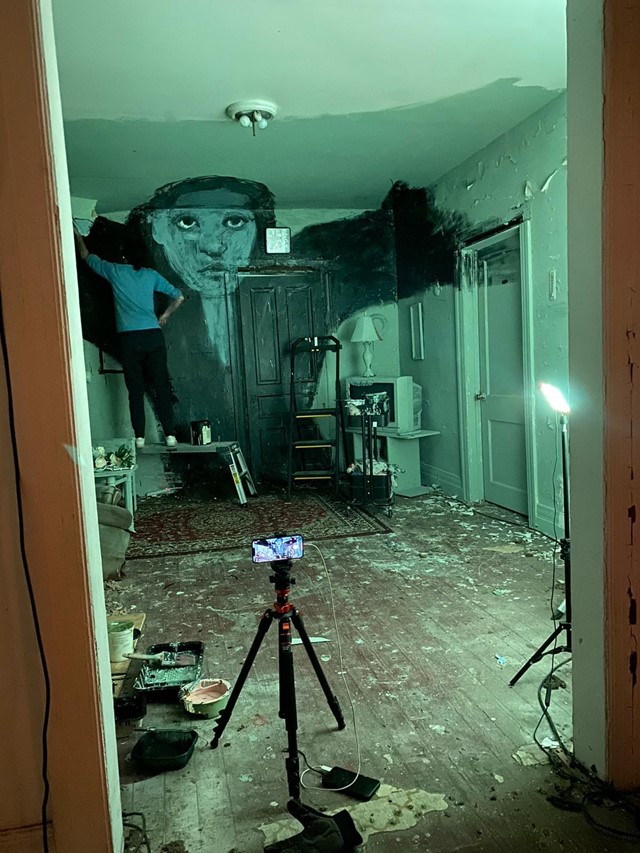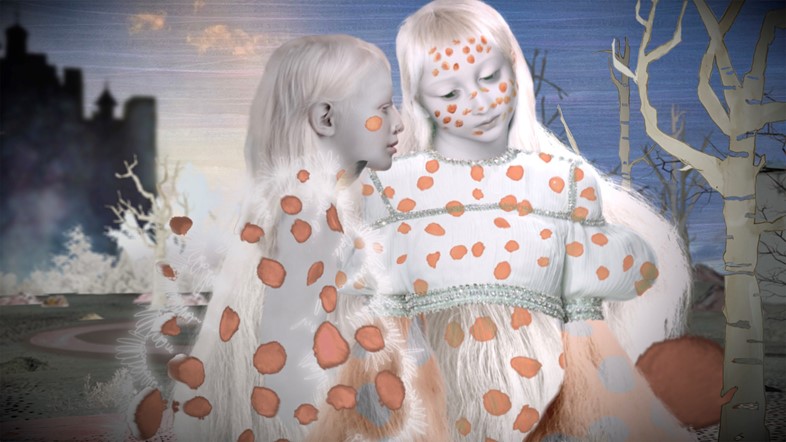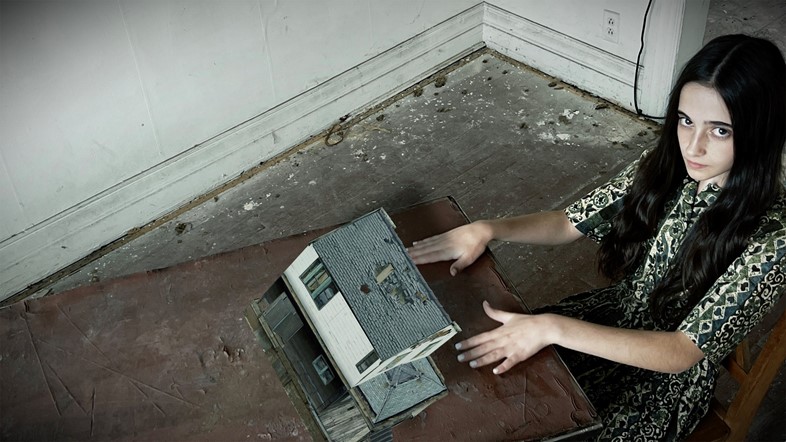
Rewrite
Streaming on Mubi now, A Place Without Fear is a haunting tale set inside a storybook house in Detroit crumbling under the weight of dissolution and neglect
Covered in paint-splattered clothes and freckles of dirt, artist and filmmaker Susanne Deeken stopped at a nearby grocery store to pick up a quick snack before calling it a night after a long day’s work back in fall 2022. While standing on line, an older Black woman looked her up and down, and then said, “You’re here to do a film, and I know it’s really cold but don’t give up.”
It was just one of the many messages Deeken would receive on her journey to create A Place Without Fear, her most accomplished film to date, now screening on Mubi. Formerly a designer for Marc Jacobs, Valentino, Maison Margiela, and Givenchy, Deeken had left the comforts of her home in London and travelled to Detroit, working all hours inside a dilapidated, abandoned house. Local friends warned her of dangers, but she was determined to go it alone, allowing the wisdom of the shadows to reveal themselves. “It was a conscious decision not to be scared. It’s like no one is going to scare me; I’m the nutter here. And it really helped me,” says Deeken, her own journey adding an unseen autobiographical layer to the film.

Set inside a storybook house crumbling under the weight of dissolution and neglect that is both the setting for the story and metaphor for the mind, A Place Without Fear is a descent into the dark labyrinth of girlhood gone off the rails. “Is she the victim or the perpetrator – or is she both?” Deeken asks. Or is she even in control of herself? It’s never entirely clear. Instead we are left to consider what the mind does to itself when stripped of all supports and left to fend for itself. “You can manipulate yourself into a frenzy, or into something more positive,” she continues. “It touches upon areas of abuse, but it’s also taking charge of certain situations.”
And that is exactly what she does in A Place Without Fear. Working as director, cinematographer, editor, art department, animator, screenwriter, and composer, Deeken adopted a true DIY approach, deftly weaving stop-motion painting, drawing, and collages with on-site painting, digital rendering and avatars into a surrealist masterpiece. “My equipment was really minimal. I shot everything on my iPhone with crappy lights. It was all very low budget,” she says of the on-site footage.

Deeken then crafted a haunting soundscape of eerie noises, stark melodies, and jarring tones produced in collaboration with local musicians from Detroit. “The sound is so important to the film, it brings it all together,” she says. “You almost need the smells – that would be the ultimate experience.”
It’s a proper nod to Deeken’s co-star of A Place Without Fear: the house itself, a modest two-story family home with a wraparound porch built during the golden age of Detroit. While the film is not extrinsically about the city, the spirit of place permeates the very air of the house, adding a layer of poignancy and pathos to the work. Over the past century, “Motor City” rose as a symbol of hope for Black America and the working class, only to be systematically dismantled until the city eventually filed for bankruptcy in 2013.
Deeken first visited Detroit while screening one of her films at the 2022 Ann Arbor Film Festival, and felt a connection that brought her back when she began scouting locations for A Place Without Fear. As fate would have it, she found a house that bore an uncanny resemblance to the mock-ups she had designed inside her London studio. “It’s a good house,” Deeken says in The Making Of: A Place Without Fear, which takes viewers on a behind-the-scenes tour that sparkles with wit and warmth.

Here, she reveals the extraordinary lengths she went to create these scenes, perhaps none so spellbinding as the room where it rains rhinestones from tattered ceilings with palatial pomp and splendour. A Place Without Fear is the spiritual heir of artists like Leonora Carrington, Leonor Fini, Remedios Varo, Hannah Höch, and Ana Mendieta, whose work reveals the sublime power of creation and destruction embedded in the divine feminine.
It is a force that permeates every aspect of the film, a fearless reclamation born of love, loss, and determination that first took root when Deeken’s dog died just one week before the pandemic first hit in 2020. Overwhelmed by grief and isolation, she began to make gifts for friends, using her paintings to narrate very short stop-motion films. One by one, the films grew into a formidable force. “I started realising how much work that actually is because it’s around 12 paintings a second,” Deeken says. “A Place Without Fear has like 50,000 paintings but the work is kind of irrelevant in the end. What counts is if it touches you or if it doesn’t.”
A Place Without Fear is available to stream on Mubi now.
in HTML format, including tags, to make it appealing and easy to read for Japanese-speaking readers aged 20 to 40 interested in fashion. Organize the content with appropriate headings and subheadings (h1, h2, h3, h4, h5, h6), translating all text, including headings, into Japanese. Retain any existing
tags from
Streaming on Mubi now, A Place Without Fear is a haunting tale set inside a storybook house in Detroit crumbling under the weight of dissolution and neglect
Covered in paint-splattered clothes and freckles of dirt, artist and filmmaker Susanne Deeken stopped at a nearby grocery store to pick up a quick snack before calling it a night after a long day’s work back in fall 2022. While standing on line, an older Black woman looked her up and down, and then said, “You’re here to do a film, and I know it’s really cold but don’t give up.”
It was just one of the many messages Deeken would receive on her journey to create A Place Without Fear, her most accomplished film to date, now screening on Mubi. Formerly a designer for Marc Jacobs, Valentino, Maison Margiela, and Givenchy, Deeken had left the comforts of her home in London and travelled to Detroit, working all hours inside a dilapidated, abandoned house. Local friends warned her of dangers, but she was determined to go it alone, allowing the wisdom of the shadows to reveal themselves. “It was a conscious decision not to be scared. It’s like no one is going to scare me; I’m the nutter here. And it really helped me,” says Deeken, her own journey adding an unseen autobiographical layer to the film.

Set inside a storybook house crumbling under the weight of dissolution and neglect that is both the setting for the story and metaphor for the mind, A Place Without Fear is a descent into the dark labyrinth of girlhood gone off the rails. “Is she the victim or the perpetrator – or is she both?” Deeken asks. Or is she even in control of herself? It’s never entirely clear. Instead we are left to consider what the mind does to itself when stripped of all supports and left to fend for itself. “You can manipulate yourself into a frenzy, or into something more positive,” she continues. “It touches upon areas of abuse, but it’s also taking charge of certain situations.”
And that is exactly what she does in A Place Without Fear. Working as director, cinematographer, editor, art department, animator, screenwriter, and composer, Deeken adopted a true DIY approach, deftly weaving stop-motion painting, drawing, and collages with on-site painting, digital rendering and avatars into a surrealist masterpiece. “My equipment was really minimal. I shot everything on my iPhone with crappy lights. It was all very low budget,” she says of the on-site footage.

Deeken then crafted a haunting soundscape of eerie noises, stark melodies, and jarring tones produced in collaboration with local musicians from Detroit. “The sound is so important to the film, it brings it all together,” she says. “You almost need the smells – that would be the ultimate experience.”
It’s a proper nod to Deeken’s co-star of A Place Without Fear: the house itself, a modest two-story family home with a wraparound porch built during the golden age of Detroit. While the film is not extrinsically about the city, the spirit of place permeates the very air of the house, adding a layer of poignancy and pathos to the work. Over the past century, “Motor City” rose as a symbol of hope for Black America and the working class, only to be systematically dismantled until the city eventually filed for bankruptcy in 2013.
Deeken first visited Detroit while screening one of her films at the 2022 Ann Arbor Film Festival, and felt a connection that brought her back when she began scouting locations for A Place Without Fear. As fate would have it, she found a house that bore an uncanny resemblance to the mock-ups she had designed inside her London studio. “It’s a good house,” Deeken says in The Making Of: A Place Without Fear, which takes viewers on a behind-the-scenes tour that sparkles with wit and warmth.

Here, she reveals the extraordinary lengths she went to create these scenes, perhaps none so spellbinding as the room where it rains rhinestones from tattered ceilings with palatial pomp and splendour. A Place Without Fear is the spiritual heir of artists like Leonora Carrington, Leonor Fini, Remedios Varo, Hannah Höch, and Ana Mendieta, whose work reveals the sublime power of creation and destruction embedded in the divine feminine.
It is a force that permeates every aspect of the film, a fearless reclamation born of love, loss, and determination that first took root when Deeken’s dog died just one week before the pandemic first hit in 2020. Overwhelmed by grief and isolation, she began to make gifts for friends, using her paintings to narrate very short stop-motion films. One by one, the films grew into a formidable force. “I started realising how much work that actually is because it’s around 12 paintings a second,” Deeken says. “A Place Without Fear has like 50,000 paintings but the work is kind of irrelevant in the end. What counts is if it touches you or if it doesn’t.”
A Place Without Fear is available to stream on Mubi now.
and integrate them seamlessly into the new content without adding new tags. Ensure the new content is fashion-related, written entirely in Japanese, and approximately 1500 words. Conclude with a “結論” section and a well-formatted “よくある質問” section. Avoid including an introduction or a note explaining the process.


